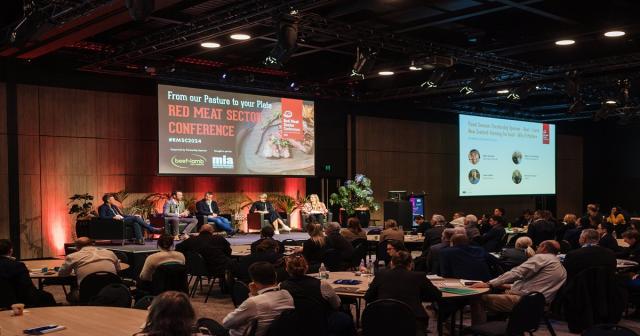The recent Red Meat Sector Conference in Wellington featured a Beef + Lamb New Zealand-sponsored panel where leading farmers discussed their personal perspectives on sustainability, intergenerational planning, and customer expectations in the evolving farming landscape.

The ‘Farming For Good - Why It Matters’ panel, facilitated by Rowena Duncum from NZME, featured leading farmers Mark Guscott of Glen Eden Farms Ltd (Martinborough), Allen & Jo Johnstone of Wallace Johnstone Ltd (Te Kuiti), and Jason Miller of Roslyn Downs (Southland).
Watch the full recording or read some of key takeaway below.
Key themes from the Panel
Personal commitment to sustainability and quality products
The theme of environmental stewardship and sustainability weaved itself throughout the panel discussion.
Miller’s Roslyn Downs farm is a part of the New Zealand Farm Assurance Programme Plus (NZFAP+), explaining how it provides confidence in their sustainable farming practices. Miller said, "It gives us a level of surety that we’re achieving auditable outcomes ... and know that our farming system is fully sustainable.”
He shared their proactive approach to environmental opportunities, such as managing 10 kilometres of waterways, which required 30 kilometres of riparian fencing. While he acknowledges this had a large cost associated, he said it led to a production gain. In planting and creating wetlands, he said "the water entering our property is of a lower quality than what is exiting."
Miller also stressed the need for continuous improvement, both for market access and personal satisfaction. He said, "If your farm isn’t sustainable or there is something you’re doing over the long term that is having a negative impact, wouldn’t you want to change that?"
NZFAP+ has enabled the Millers to take a data-driven approach. "When people come onto our place or when customers come in and question us, we’ve got data that can back up our farming system," he said.
Miller also discussed the challenges of wintering stock in Southland and their innovative grazing systems, where cattle only stay on a piece of ground for 24 hours before moving on.
Guscott has been a part of the Atkins Ranch Regenerative Farming programme for around four to five years now. He reckons it’s a good thing that there isn’t a set definition yet because to him, regenerative agriculture is about “introducing new ideas to what’s already a dynamic industry. Doing what we’re already doing with some tweaks.”
“We believe there’s a market segment out there that wants to do right by the planet, and we think the way we farm is already doing that … so, it’s about how you monetise that.
“It just feels right. It’s been really rewarding. We’ve done different things - some have worked, some haven’t - and we’ve managed to get the market premium from time to time,” he said.
The Johnsons shared some of their environmental efforts, such as planting 35,000 native trees in the past five years, Jo said “that’s something we’re very proud of.”
“We’re passionate about our product, about being profitable, the environment, and most importantly about people.”
Jo Johnstone highlighted the importance of their consumer and their dedication to producing high-quality food. She said, "We’re focused on a product of delicious, healthy high-quality food and we think it’s important that we walk the walk…[The customer] have to appreciate the product we put out there.”
They are a part of the Silver Fern Farm Zero Carbon Beef programme and shared some insights into what it takes being a part of the programme and some of the rewards so far.
Taking a long-term, intergenerational view
Planning for future generations was of importance to all panelists.
Miller highlighted the importance of intergenerational farming for Roslyn Downs. "We’re an intergenerational farming family. That really drives a lot of our behaviours and how we think about the business [and] the industry. We take a long-term view in everything and that leads into what we do around sustainability, environment, and animal welfare.
“We have a saying in our business: the standard you set is what you’re prepared to walk past. So, it’s really important to us,” he said.
The Johnstones emphasised the long-term vision of their farm as a fourth-generation farm.
"Our ethos is ‘to continue generations of excellence’. The reason we chose that statement is because it recognises where we’ve come from, it recognises where we are at the moment, and also planning for the future.
“We absolutely love what we do. We consider ourselves very lucky to do what we do…We have our children Lilly and Harry who are in their early twenties looking to take the baton on. We are always planning for the next 100 years and beyond," says Jo Johnstone.
Guscott also shared insights into their multigenerational farming journey at their Martinborough farm, highlighting the deep-rooted legacy aspects of their operation. “I think about it in a 500-year view, and it is difficult to separate your day-to-day decision from that sort of thinking,” he said.
Guscott spoke about how they added their own aspects to the business by diversifying to include arable farming and tourism.
Mark Guscott shares positive message with New Zealand
Following the panel session, NewstalkZB’s Kerre Woodham spoke to Guscott on her morning show about being adaptable, staying positive and taking a long-term view to farming in New Zealand. Listen to the full interview on iHeart Radio here.
The interview, arranged by B+LNZ, is part of our work to champion our farmers positive story with wider New Zealanders.
Red Meat Sector Conference
B+LNZ is proud to be the partnership sponsor of the Red Meat Sector Conference, run by the Meat Industry Association. Learn more by visiting the official Red Meat Sector Conference website.
Watch the full panel discussion in the recording above or on YouTube.